Best utes: Ford Ranger v Toyota HiLux v Mitsubishi Triton
Four-wheel-drive workhorses are big business these days and there are two clear leaders in the sales race. But a new take on an old rival could change all that.
New Cars
Don't miss out on the headlines from New Cars. Followed categories will be added to My News.
Mitsubishi reset the Triton formula this year.
Tired of having sand kicked in its face by bigger, stronger and more expensive rivals, Mitsubishi pumped up its pick-up for a new era. But is it better than the dominant cars in the class, the Ford Ranger and Toyota HiLux?
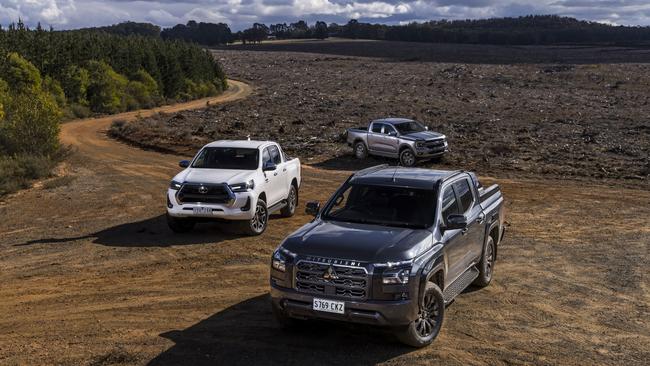
MITSUBISHI TRITON
This is a different kind of Mitsubishi ute.
The previous-generation Triton couldn’t match the power, torque or towing capacity of larger rivals.
But the new model can, thanks to a twin-turbocharged 2.4-litre engine that uses 7.7L/100km of diesel to make 150kW and 470Nm.
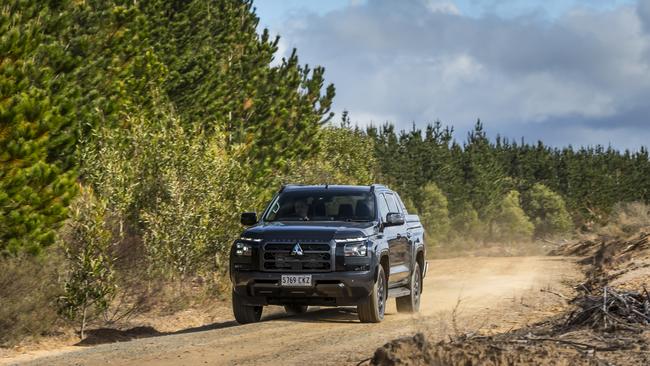
There’s a bit of lag from the Triton, which needs a moment to build turbo boost before really getting going.
Our test car, the top-end GSR model, looks particularly menacing in graphite grey with dark alloys, wheel-arch extensions, roof rails and sports bars.
It trades the chrome highlights and car-like styling cues of the previous model for bluff, truck-like looks inspired by American pick-ups.
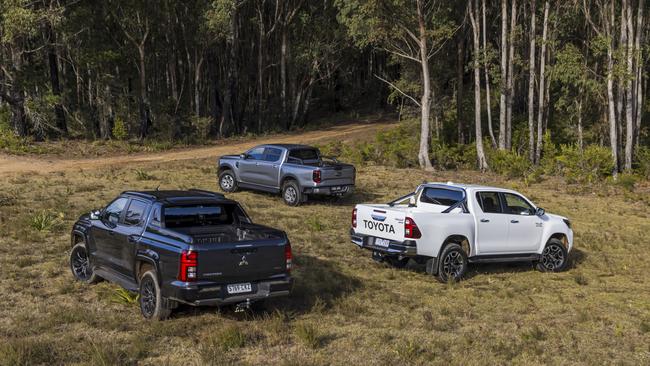
The interior represents a significant step up from the old car, introducing better materials and a larger infotainment screen but not the digital dashboard customers should expect at this price point from a new-for-2024 model.
It feels a league beyond the workmanlike HiLux, but a generation behind the Ranger. The driving experience is middle-of-the-road too, feeling more comfortable than the bouncy HiLux on dirt, but nothing like as planted as the Ford.
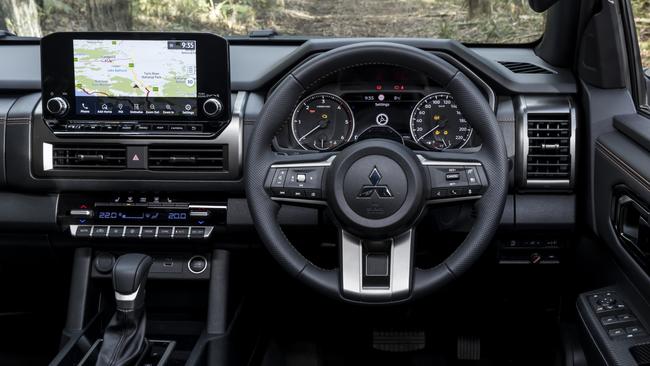
Priced from $63,840 plus on-roads (about $70,000 drive-away), the Triton is about $7000 more than the old model, and delivers luxuries you won’t find in a Toyota or Ford at this price, such as heated leather seats and a 360-degree camera.
The Triton also wins points for being the cheapest to service, and for a five-year warranty that doubles to 10 years if you service it through official dealers.
It’s loaded with modern safety and efficiency features – though that’s not necessarily a good thing.
The fuel-saving stop-start system in the Triton is coarse and clunky compared to smoother rivals.
But that’s a minor inconvenience alongside the persistent nagging of its driver monitoring system that constantly beeps, bongs and flashes up warning messages if you so much as glance away from the road.
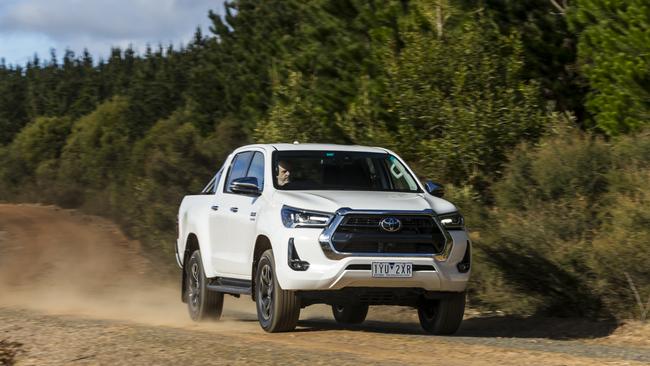
TOYOTA HILUX
Loyalty goes a long way in the land of the ute.
The Toyota is a dated machine that feels due for replacement, yet it still sells in huge numbers on the strength of the HiLux brand.
Mid-life upgrades brought the HiLux up to speed a couple of years ago with a punchier motor that uses 8.1L/100km of fuel to make 150kW/500Nm, along with the ability to tow 3.5 tonnes.
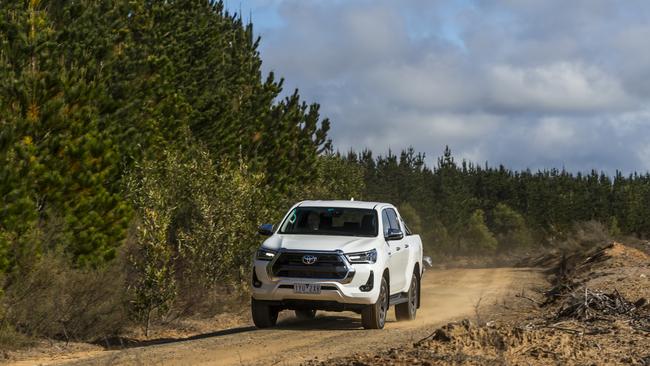
Toyota introduced a mild-hybrid option to the HiLux this year but they were not available to provide one for our test, so we made do with the conventional version.
It still feels surprisingly urgent in a straight line, a sensation magnified by the 2.8-litre engine’s gruff nature – it’s the loudest of this trio.
Stiff suspension feels the least settled of this group on gravel, returning a bouncy ride without weight in its bare, unlined tray.
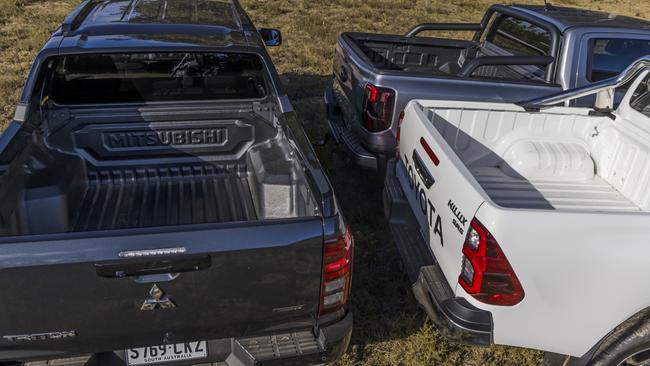
The interior is familiar but by no means particularly modern. You sit high in the Toyota, with a commanding view of the road ahead.
It is usefully cheaper than the Triton and Ranger at about $68,000 drive-away, but lets the side down with more expensive servicing, the result of six-month maintenance intervals that will make you more than familiar with the waiting room of your local dealership.
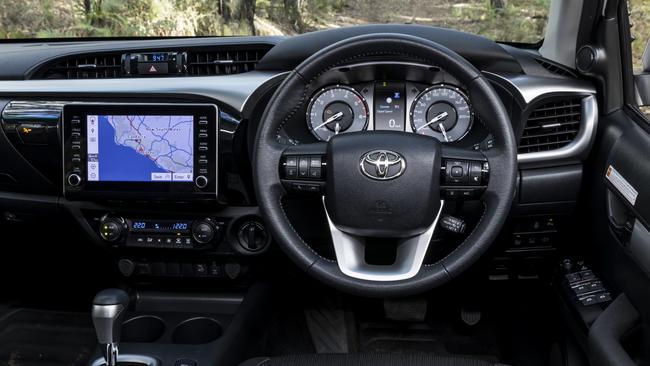
The oldest car of this trio will benefit from an overhaul in the near future.
Then again, when thousands of customers buy the HiLux for its badge, you can’t blame Toyota for taking its time introducing a new model.
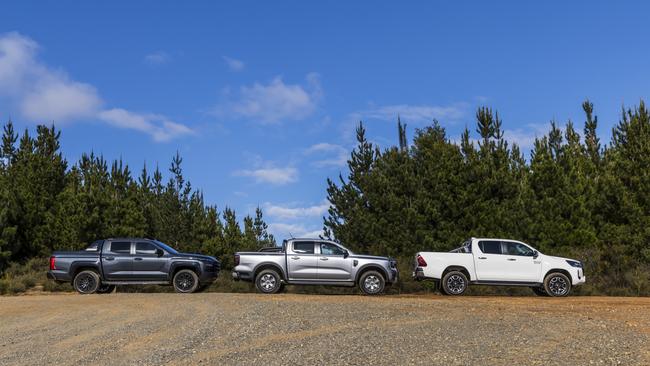
FORD RANGER
Unlike Toyota resting on its laurels or Mitsubishi setting its sights on a middle-of-the-road product, the Ford Ranger represents a determined attempt to build the best car in its segment.
It’s the only car here with a digital dash and portrait-style touchscreen, and the only one with nine airbags.
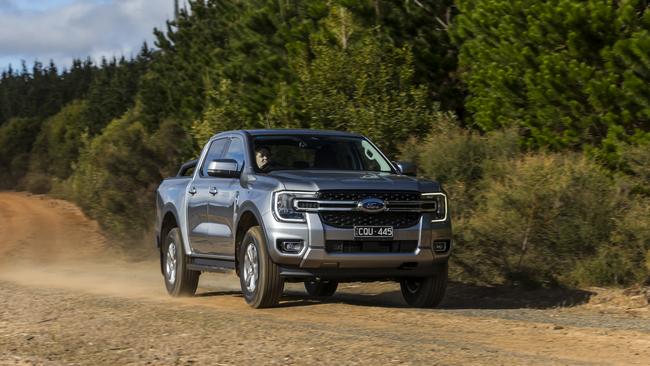
It has plenty of safety tech – but happily dodges the Mitsubishi’s driver monitoring system – and a comfortable driving position with a broad range of adjustment to help you get settled behind the wheel.
The 2.0-lite twin-turbo engine uses the least fuel (7.6L/100km) to make the most power (154kW/500Nm), helped by a 10-speed automatic transmission that keeps the motor in its sweet spot.
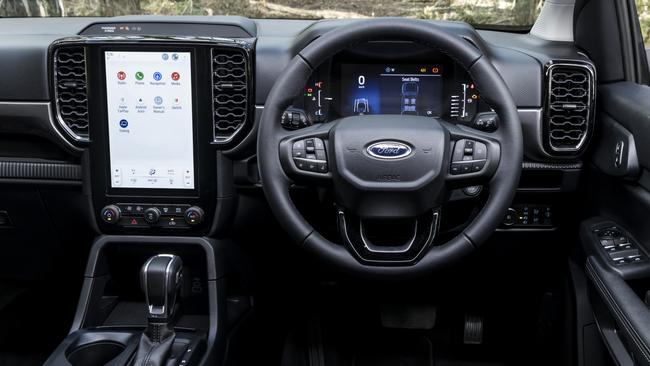
And there’s a more powerful V6 option – or the truly wild Raptor – for folks who want more go.
The Ranger’s suspension is the most supple here by a good margin, feeling more car-like on tar and less flustered on broken surfaces.
It really is the benchmark ute today.
That is why Ford can charge more money – about $70,000 drive-away – model-for-model, meaning that the more expensive Ranger Wildtrak is a better match for the Triton GSR, though it costs about $76,500 drive-away.
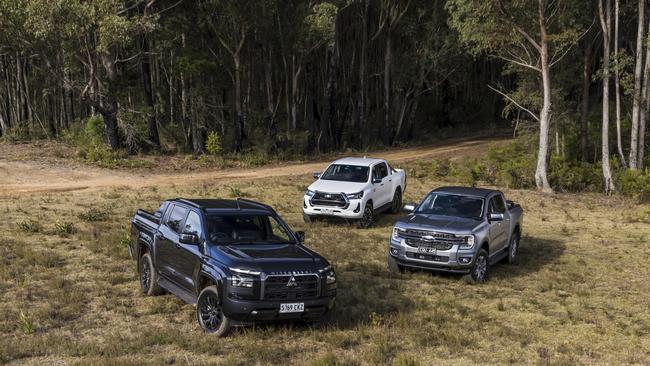
David McCowen is on instagram @davemccowen
VERDICT
The new Triton closes the gap to rivals but lacks the finesse of the class-leading Ranger, which remains our pick of the dual-cab segment today.
TOYOTA HILUX SR5
PRICE About $68,000 drive-away
ENGINE 2.8-litre 4-cyl turbo diesel, 150kW and 500Nm
THIRST 8.1L/100km
WARRANTY/SERVICE 5-yr/u’ltd km, about $3600 for 5 yrs
SAFETY 7 airbags, auto emergency braking, active cruise control, blind spot monitoring, rear cross traffic alert
SPARE Full-size
TOWING 3500kg
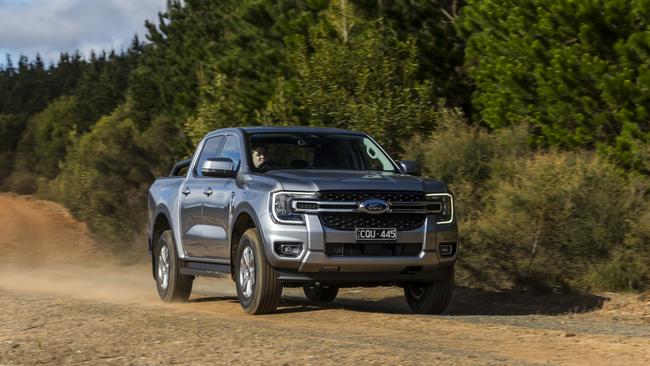
FORD RANGER XLT 2.0
PRICE About $70,000 drive-away
ENGINE 2.0-litre 4-cyl turbo diesel, 154kW and 500Nm
THIRST 7.6L/100km
WARRANTY/SERVICE 5-yr u’ltd km, about $2500 for 5 yrs
SAFETY 9 airbags, auto emergency braking, active cruise control, blind spot monitoring, rear cross traffic alert
SPARE Full-size
TOWING 3500kg
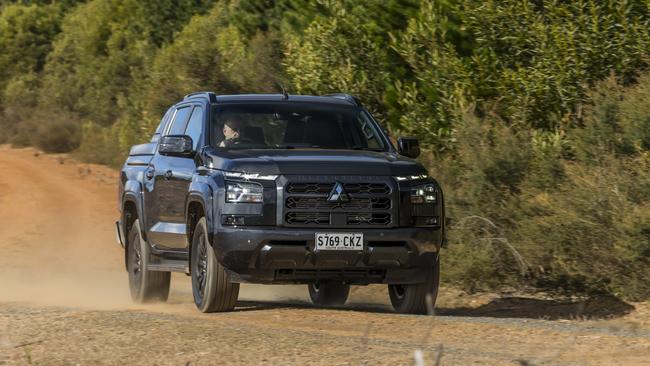
MITSUBISHI TRITON GSR
PRICE About $70,000 drive-away
ENGINE 2.4-litre 4-cyl turbo diesel, 150kW and 470Nm
THIRST 7.7L/100km
WARRANTY/SERVICE 5-yr u’ltd km, about $2450 for 5 yrs
SAFETY 8 airbags, auto emergency braking, active cruise control, blind spot monitoring, rear cross traffic alert
SPARE Full-size
TOWING 3500kg
Originally published as Best utes: Ford Ranger v Toyota HiLux v Mitsubishi Triton



